![]()
Sun, Sept 12, 2010 | The Meir Amit Intelligence and Terrorism Information Center
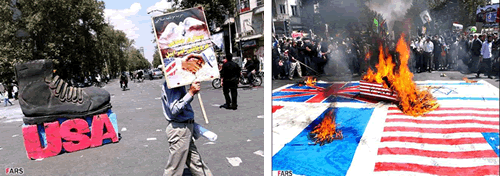
Photographs taken at the Quds Day rallies in Iran. Left: an exhibit showing a shoe stepping on the US; right: Israeli, US, UK, and French flags set on fire (Fars News, September 3, 2010)
Quds Day Events Used to Support the Palestinian Cause and Hostility Towards Israel and the West
The Iranian regime took advantage of the annual Quds Day events to highlight an alternative political and ideological agenda to that of the US; strongly criticized the Israel-PA negotiations; called to continue the “resistance” (terrorism); and spread vicious incitement against Israel, the Jewish people, the US, and the West.
Overview
Since it was first conceived by Khomeini and the government of Iran in 1979, Quds Day (“Jerusalem Day”) is held annually by the Iranians and their supporters on the last Friday of the month of Ramadan. Marked in Iran, the Middle East, and elsewhere in the world, the events are a show of support from Iran and the Muslim world for the Palestinian cause and the “liberation of Jerusalem”, and also a statement of defiance against the US and the West (“the arrogant powers”).
This year’s Quds Day was marked on September 3. As in previous years, Iran was the focal point of the events. Numerous demonstrations, rallies, and speeches were held in Tehran and in other Iranian cities, accompanied by a media campaign as well. Similar events also took place throughout the Middle East and beyond, albeit on a much smaller scale. Quds Day events were held, among other things, in Lebanon (led by Hezbollah), the Gaza Strip (organized by Hamas and the PIJ), Syria (organized by the Palestinians), Turkey (organized by radical Islamic organizations), India (where Shi’ites took part in the demonstrations), Pakistan (where an IED killed 37 demonstrators), Afghanistan, Azerbaijan, the US, Europe, and other world countries, including New Zealand, South Africa, and Venezuela.
Even though Quds Day bears an Iranian-Shi’ite character, the events were held not only in countries with large Shi’ite communities (Iran, Lebanon, Iraq) but also in countries with a Sunni majority (Turkey, Pakistan, Afghanistan). The events held outside of Iran were mostly orchestrated by organizations or activists who share Iran’s ideological or religious worldview, in which support of the Palestinians coexists with intense hostility towards Israel, the West, and its values.
The organizations and activists which took part in Quds Day’s events included the following: a Shi’ite terrorist organization operating in Lebanon (Hezbollah), radical Islamic activists in Sunni countries (such as Turkey), Sunni terrorist organizations supported by Iran (Hamas and the PIJ in the Gaza Strip), pro-Iranian Shi’ite activists in countries with Shi’ite populations (such as India), and anti-Israeli and pro-Palestinian activists in the West (US, UK, and other European countries).
The Quds Day events were used by the Iranians and their supporters to disseminate political propaganda, such as delegitimizing Israel (“the cancerous tumor”) and calling for its destruction; spreading anti-Semitic hate using The Protocols of the Elders of Zion to slam Israel, Zionism, and Judaism; engaging in anti-American and anti-Western incitement; rejecting the direct negotiations between Israel and the Palestinians, denying their legitimacy; attacking moderate Arab governments and the PA; and praising the path of “resistance” (terrorism and violence). In addition, slanderous remarks were made against Iran’s opposition movement and its leaders.
Messages incorporated into speeches given by the president of Iran and other top Iranian speakers emphasized their opposition to the Israel-PA negotiations and their denunciation of the moderate Arab countries. Those messages are a reflection of Iran’s desire to present an alternative political-strategic or even ideological worldview to that of the US and the West, and to position itself at the forefront of those who oppose the US-led regional processes taking place in the Middle East, mainly the peace process. As a result, the Iranians emphasized the international character of Quds Day, whose aim, according to them, is not only to free Palestine but also to liberate other nations from the burden of the “arrogant powers”.
Following is a summary of Quds Day events in Iran and in other places in the Middle East and elsewhere.
Appendix A
Quds Day events in Iran
Overview
On the occasion of Quds Day, the Iranian regime organized a series of events in Tehran and other cities. They were attended by large crowds and were accompanied by a media campaign. Posters and announcements published on the eve of Quds Day said that the days of the “Zionist regime” are numbered, and that its fate is already sealed.
As in previous years, demonstrators who took part in Quds Day events carried signs and chanted slogans calling for Israel’s destruction. The demonstrations also featured slogans and exhibits against the US, UK, and some other countries, such as France. Blatantly anti-Semitic speeches given at the rallies stressed that the existence of the State of Israel is illegitimate. Demonstrators also chanted slogans against opposition leaders Mir-Hossein Mousavi and Mehdi Karoubi, whose residences had even been attacked.[1]
This year’s Quds Day events in Iran were marked by strong criticism of the beginning of direct talks between Israel and the Palestinians. Iran’s President Ahmadinejad argued that the talks are futile and constitute an offense against the Palestinian people, and that the only way to “liberate Palestine” is to follow the path of “resistance” (i.e., terrorism and armed struggle). At the same time, the Iranian regime emphasized its own unique agenda, which goes against the moderate Arab countries’ willingness to compromise and make concessions on the issue of Palestine. The president of Iran took advantage of his Quds Day speech to make statements designed to further alienate the rulers of Arab countries from their people.
Major statements made by top Iranian officials
As part of the Quds Day events, Iran’s President Ahmadinejad gave two strongly-worded speeches: one was given on the eve of Quds Day, when he granted an extended interview to the Arabic-language Al-Alam TV channel (aimed mostly at Arab target audiences); the other was a speech given prior to the Friday sermon, aimed at the people of Iran. In the Al-Alam interview, the president stressed the global significance of Quds Day: according to Ahmadinejad, the issue of Jerusalem is not limited to one geographic area; it is not just a Palestinian issue and it is, in fact, “even greater than the issue of Islam”. He further added that Quds Day is a reflection of a humanitarian Islamic issue, since Islam is against the occupation of other countries, colonialism, exploitation of others, and attacks on countries in the region (Al-Alam TV, September 2, 2010).[2]
In an anti-Semitic comment on Zionism, Ahmadinejad argued that “Zionism is a radical, cultureless political party, which seeks to rule over all the oppressed people, destroy world culture, and take over the political and economic sources of power…” According to Ahmadinejad, the US bows to the whim of the “Zionist entity”. In the interview, he also discussed the futility of the direct talks between Israel and the Palestinians, saying that even if “they last 2,000 years, they will yield no results… Even if any document is signed, it will not lead to any sort of recognition of the Zionist regime’s legitimacy… We believe that there is not one person in the world willing to recognize the Zionist regime’s legitimacy, with the exception of a few Jewish businessmen in the United States who hold political and financial power… Even the nations of Europe do not recognize the legitimacy of that regime”.
Ahmadinejad took advantage of the Friday sermon to give a strong-worded, provocative speech reiterating his ideological view of the historical circumstances surrounding the establishment of the “false Zionist regime”. In his speech, Ahmadinejad gave a viciously anti-Semitic description of the characteristics of “world Zionism”, denied the Holocaust once again, and criticized the peace talks between the “Zionist entity” and the PA. He stressed that such talks had already failed before and that, at any rate, “the fate of the Palestinians will be decided in Palestine by the Palestinians themselves through [armed] struggle—not in Washington, Paris, or London”. He also called on Arab countries to prepare for their main task (i.e., the elimination of Israel) at the appropriate time and to stop being afraid of the West (to which he referred as a “paper tiger”). He further noted that the myth of an invincible Israel is no more, stressing that even Israel’s masters (the US) are too weak to attack Iran.
On the eve of Quds Day, Iran’s Revolutionary Guards issued a particularly harsh statement claiming, among other things, that the massive participation in Quds Day events is actually a practical step towards “the destruction and elimination of this cancerous tumor [Israel] in the region, in spite of the hegemonic media [referring to what Iran claims are biased Western media] and the dissenting movement from within [referring to the green opposition movement]…” The statement further says that it is the duty of the Muslim nation, led by Supreme Leader Khamenei, “to put an end to the international occupation and the shameful conduct of the Zionist soldiers”, and that “the Islamic nation is completely serious about condemning any diabolical political settlement or peace talks from ignorant Arab leaders”.[3] Also according to the statement, the sensitive international and regional conditions indicate that the Great Satan (the US) and the Zionist regime are growing increasingly concerned that the countdown to the destruction of the bloodsucking, criminal entity is closer than ever.”[4]
Ayatollah Ali Akbar Hashemi Rafsanjani, chairman of the Assembly of Experts and head of the Expediency Discernment Council, argued that the massive participation in the Quds Day rallies will help undermine the foundations of the Zionist regime.[5] Rafsanjani also voiced criticism of Ahmadinejad’s provocative and harsh remarks, saying that one must not allow thoughtless remarks and statements made by Iran to lead to the collapse of the “global wall of isolation and hatred against the Zionist regime, which was paid for with Palestinian blood,” and let that wall be replaced with “a wire fence for the occupiers’ protection”.[6] Rafsanjani claimed once again that the Israeli regime is false and that its establishment was motivated by the interests of several countries that wanted to drive out the Jews living in those countries.[7] He concluded by stating that the only way to fight the Zionist regime is through popular resistance and the continuation of (armed) struggle, as well as the unification of all the branches of Palestinian resistance.[8]

Rafsanjani, head of the Assembly of Experts and the Expediency Discernment Council (ILNA, September 3)
More statements follow:
a. Iran’s Foreign Minister Manouchehr Mottaki stressed that the direct reconciliation talks between Israel and the Palestinians have no legitimate basis, since “Abu Mazen’s tenure is long over” and, as various Palestinian factions emphasized, “the talks are unacceptable”. Mottaki reiterated that resistance (i.e., terrorism) is the only way to liberate Palestine.[9]
b. Mohsen Reza’i, secretary of the Expediency Discernment Council, said that a global movement needs to be established to combat Zionism. Speaking about the negotiations between Israel and the Palestinians, he said that the talks will once again end in a failure, and that Israel’s purpose in holding the talks is to ensure its self-preservation, as it recognizes that its existence is on the line (ISNA, September 3, 2010).
c. Iranian Majles speaker Ali Larijani, who also took part in the Quds Day rallies, stressed that the Palestinian people had clearly stated their opposition to the
compromise talks in Washington. He added that while the “arrogant powers” push for reconciliation talks, the massive participation in the Quds Day rallies is a crushing answer to the US and its peace efforts.[10]d. Mohammad Reza Naqdi, chief of the Basij (the volunteer force of the Revolutionary Guards), said that “the fall of the Zionist regime is Allah’s wish.” He added that nothing will remain of the Zionist regime in 15 years at the most, and that it will meet the same fate as the communist regime and the apartheid regime in South Africa.
Distribution of computer games for disseminating anti-Israeli and anti-Semitic messages on Quds Day
Various other activities were held on Quds Day to promote the incitement of hatred against Israel and the Jewish people. Such activities included the distribution of new computer games titled Devil Den 2 and Freedom Flotilla, produced by Basij students. The major theme of Devil Den 2 is the book The Protocols of the Elders of Zion; the game aims to “educate [Iranian] youth on the illegitimate foundations of the Zionist regime and the inhuman protocols, and on Zionist ideology as well.”[11] The theme of the second video game (Freedom Flotilla) is the Gaza Strip flotilla.

A video game used to disseminate messages drawn from The Protocols of the Elders of Zion (Mehr News Agency, September 3, 2010)
Deputy Head of Iran’s Armed Forces Joint Chiefs of Staff Masoud Jazayeri said that the computer games are designed to “change the preferences of Iran’s computer users, who are exposed to and inundated with US and Israeli-made games”, and that Iran is planning a series of sequels to Devil Den.
Quds Day used to tar the opposition
Having learned the lessons from last year’s Quds Day events, which were used by the opposition for anti-government activities, this year the Iranian regime made careful preparations to deal with the opposition in an organized fashion. The strict security measures included arrests of activists[12] with green ribbons, as well as disruptions of internet communications.
At the same time, the regime took extensive measures to delegitimize the green movement and its leaders in direct connection with Quds Day. The leaders of the green movement, particularly Mir-Hossein Mousavi, were portrayed as puppets controlled by the US and Israel, who ignore the suffering of the Palestinian people. In addition, posters shown by the regime at an exhibition in Tehran claimed that Mir-Hossein Mousavi is a façade for no other than Massoud Rajavi, who, together with his wife Maryam, leads the Mojahedin-e Khalq (an Iranian opposition organization operating from Iraq) (Fars News Agency, September 3).
On the eve of Quds Day, the regime mobilized plainclothes militiamen and Basij forces for pinpoint operations against the leaders of the reformist camp (particularly Mehdi Karoubi and Mir-Hossein Mousavi) to keep them from taking part in the events.[13] The two leaders’ residences were attacked, and windows in Karoubi’s residence were smashed. Karoubi released an online statement calling on his supporters to stay away from his residence to avoid conflict with the plainclothes militiamen and Basij forces surrounding it. In a similar operation conducted by the regime, students loyal to reformist cleric and Assembly of Experts member Dastgheib confronted plainclothes militiamen and Basij forces near the Qoba mosque in Shiraz. Iran’s security and police forces did not intervene.[14]
Anti-Israeli and anti-US incitement
Appendix B
Quds Day events in Lebanon
As in previous years, Hezbollah played a leading role in this year’s Quds Day events in Lebanon. Hezbollah leader Hassan Nasrallah delivered a speech through a large screen at the Quds Day ceremony held in Beirut’s Sayyed al-Shuhada compound. His speech was similar in its messages to the speeches given by the leaders of the Iranian regime. Nasrallah stressed the Muslim nation’s commitment to the issue of Jerusalem, Palestine, and the struggle against Israel. He said that Jerusalem is the capital of Palestine, since Israel is illegal and is an entity established “through theft, murder, and massacre”.
Speaking about the direct negotiations between Israel and the Palestinians, Nasrallah said that the negotiations were “stillborn” since most of the Palestinian organizations stated their opposition. He further added that, in recent years, historical achievements have been made through passive as well as active resistance (Al-Manar, September 3, 2010).
Appendix C
Quds Day events in the Gaza Strip and in Syria
A mass rally was organized in Gaza Strip on the occasion of Quds Day, with the participation of members of Gaza Strip terrorist organizations. The demonstrators carried Hamas and PIJ flags and called to escalate the “resistance”. In a speech given by Hamas Legislative Council member Ismail al-Ashqar, he said that “resistance” is the necessary response to Israel’s “aggression”. He added that Jerusalem is under a “Zionist attack” and can be liberated not by negotiations but “only the way it was liberated by Saladin, through resistance”.
Senior PIJ operative Khaled al-Batash said that Quds Day, conceived following the Camp David Accords, is a day of Islamic unity. He further stated that the negotiations will lead to riots and war in the Middle East (Palestine-info, September 3, 2010).
PA spokesman Nabil Abu Rodeina responded to the attacks made by the president of Iran on the direct negotiations between Israel and the PA. “Someone who does not represent the Iranian people,” he said, “forged the election, suppressed the Iranian people, and cheated his way to power should not be talking about Palestine” (Wafa, September 5, 2010).
Syria
Quds Day events in Syria were marked by a mass rally held in the Yarmuk refugee camp. Demonstrators carried flags of Syria and Palestine, as well as photographs of Imam Khomeini, Hezbollah leader Hassan Nasrallah, and Syria’s President Asad. Also shown were photographs of Palestinian shaheeds. In several speeches made during the demonstration, spokesmen condemned the “Israeli occupation”, issued warnings about Israel’s intentions with regard to Jerusalem, and voiced criticism of the re-launched negotiations between Israel and the Palestinians (Sana News Agency, September 5, 2010).
Appendix D
Quds Day events in Turkey
In Turkey, Quds Day was marked by demonstrations and events held across the country, including in Istanbul’s Beyazit Square, Bursa, Diyarbakir, and others. Demonstrators expressed the Turkish people’s sympathy with the Palestinians, shouted calls against Israel and the US, and burned flags of those countries.
Most of the events were organized by the Islamic Organization of the Oppressed (Mustazaf-Der). Mustazaf is an Ottoman Turkish and Persian term referring to an oppressed, rightless person.[15] The organization started operating in Turkey in 2000-2001 in response to the Turkish army’s oppression of the local Hezbollah organization (which supported the Kurdish PKK), and with the aim of assisting all those under oppression in reclaiming their rights. The organization was officially established in 2003, and has branches in the cities of southern Turkey and eastern Anatolia. The organization also has its own publishing house.
Some of the 500 people who took part in a demonstration held in Istanbul’s Beyazit Square after the Friday prayer waved Hamas and Hezbollah flags and
burned a uniformed mannequin carrying the flags of Israel and the US. Demonstrators also read the names of the nine Turks killed on board the Mavi Marmara
(www.haberler.com).
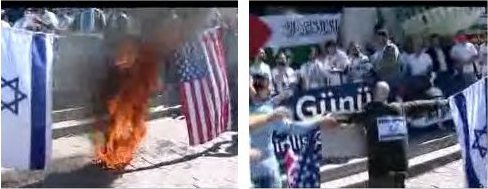
The demonstration held in Istanbul’s Beyazit Square, during which a uniformed mannequin carrying the flags of Israel and the US was set on fire
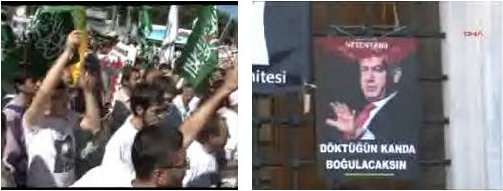
Left: demonstrators carrying Hamas and Hezbollah flags; right: a poster denouncing Israel’s PM Binyamin Netanyahu (www.haberler.com)

Left: demonstrators display a poster in English that reads, “Annihilation of Israel is our mission”; right: pictures of Nasrallah and flags of Hamas at the demonstration in Istanbul (Al-Manar, September 3, 2010)
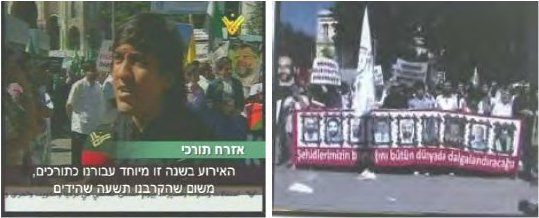
Left: a Turkish citizen says that this year’s events were also dedicated to the shaheeds who died on board the Mavi Marmara (Al- Manar, September 3); Right: photographs of the Turkish nationals killed on board the Mavi Marmara carried by demonstrators during one of the Quds Day rallies, above the photographs is the IHH flag.
Appendix E
Quds Day events in Pakistan, Afghanistan, and Azerbaijan
Pakistan
Quds Day rallies were held in several cities across Pakistan. In Quetta, a city with a Sunni majority in southwestern Pakistan, the anti-Shi’ite Taliban took advantage of Quds Day to commit a terrorist attack. A suicide bomber blew himself up among a crowd of rally goers, killing about 73 people and injuring about 160. Terrorist attacks motivated by religious or ethnic conflicts occur in Pakistan from time to time, and it was the fourth terrorist attack that week perpetrated against Pakistani Shi’ites (the other three took place in the city of Lahore).
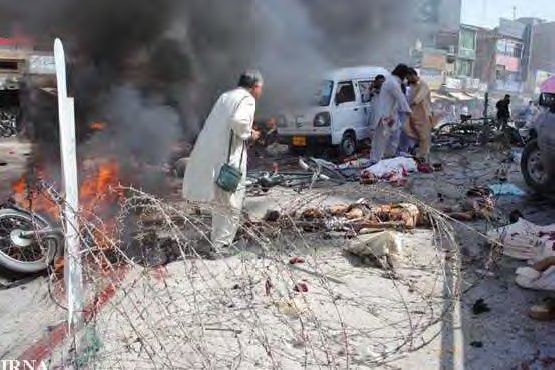
The scene of the terrorist attack in Quetta where a suicide bomber blew himself up (IRNA, September 3, 2010)
Afghanistan
Azerbaijan
Appendix F
United States
Quds Day activities in the US included several rallies at which speakers delivered anti-Israeli (and sometimes anti-Semitic) speeches. For example, Imam
Abolfazl Nahidian accused Israel of carrying out the September 11 attacks to justify the occupation of Muslim lands such as Iraq, Afghanistan, and northern Pakistan.
Kaukab Siddiqi, an English professor from Lincoln University, PA, called on Muslims to wake up and “let truth about Israel be known”, stating that Muslims should put their hand on the Quran and say that they do not recognize Israel as a legitimate entity. In addition, he called on Muslims to unite against the “many-headed monster” calling itself Zionism to destroy, crumble, and defeat Israel. In the background, demonstrators shouted calls such as “justified resistance [i.e., terrorism] against the occupation”, “Zionism is racism”, etc. Flags of Hezbollah,[16] designated as a terrorist organization in the US, were waved by demonstrators.
Appendix G
Quds Day events in Europe
United Kingdom
Several events with extreme anti-Israel themes were organized in London, mostly by an Islamic organization known as the Islamic Human Rights Commission (IHRC). The participants were Palestinian, Arab, and British demonstrators. Several Neturei Karta[17] members also took part in the demonstrations.[18]

The website of the organization that organized the London demonstrations. IHRC is a London-based Islamic (and apparently pro-Iranian) organization whose goal is to “stand up in defense of the oppressed” (www.ihrc.org). According to the Stephen Roth Institute at Tel-Aviv University, it is a radical organization which promotes jihadist activities worldwide.
Germany
According to a statement released by the Berlin police, about 500 people marched in the Quds Day rally in Berlin, opposed by about 150 counter-demonstrators. The participants waved flags of Iran and Hezbollah (Jerusalem Post, September 5, 2010).
France
Belgium
Norway
Appendix H
Quds Day events in India
Quds Day events in other countries
New Zealand

Quds Day convention held in Auckland and sponsored by Ahl al-Bayt, an organization which coordinates Shi’ite activities around the world (IRNA, September 3, 2010)
South Africa
Venezuela
Notes:
[1] The lessons learned last year, when Quds Day events were used by the opposition to voice criticism of the Iranian regime (“Not Gaza, not Lebanon, I will sacrifice my life for Iran”), prompted the regime to prevent Mir-Hossein Mousavi and Mehdi Karoubi from taking part in the events.
[2] This is yet another example of state sponsors of terrorism (of which Iran is one), terrorist organizations, and radical Islamic organizations often using the word “humanitarian” in obviously political contexts, adopting a terminology that is accessible to Westerners.
[3] Fars News, August 31, 2010.
[4] farsnews.
[5] farsnews.
[6] bit.ly.
[7] president.ir.
[8] farsnews.
[9] presstv.ir.
[10] farsnews.
[12] hra-news.biz.
[13] sahamnews.org.
[14] iranpressnews.
[15] When Quds Day was first proclaimed by Khomeini, he said that it was not simply a day devoted to Jerusalem but also “a day for the oppressed to rise and stand up against the arrogant” (referring to the US and imperialist powers). In its early days, Hezbollah used the term “Earth’s oppressed” as a codename for terrorist attacks in Lebanon aimed mostly against Western targets.
[16] investigativeproject.org.
[17] Ultra-orthodox, anti-Israeli Jews.
[18] demotix, demotix, demotix, hurryupharry.org, middleeastmonitor.org.uk, Youtube.



 RSS
RSS

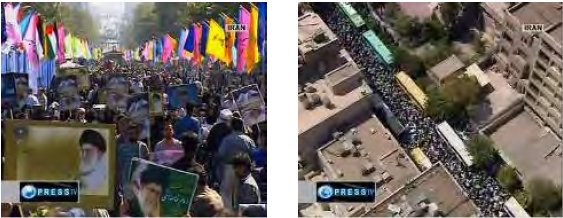

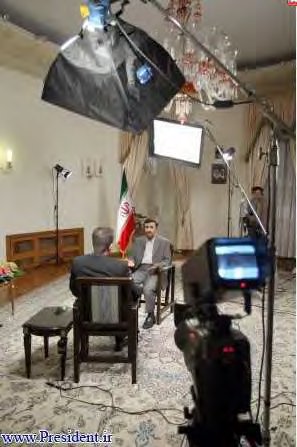

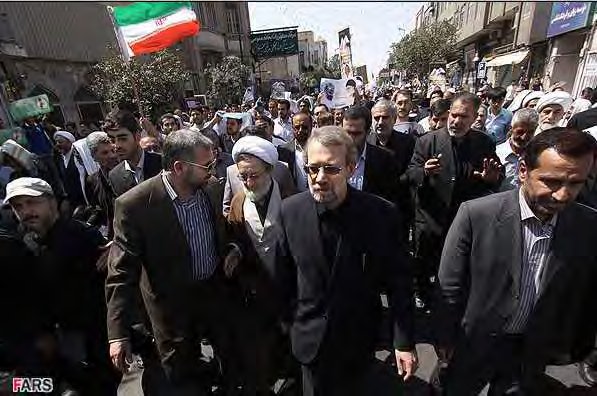






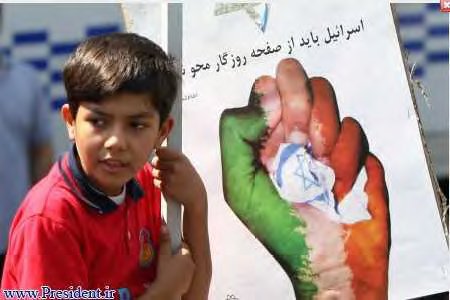


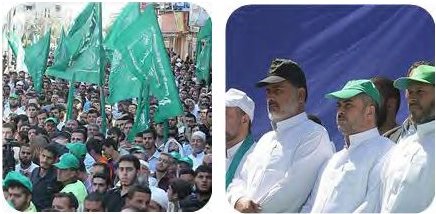
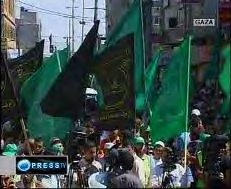
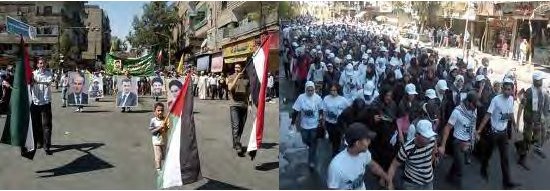


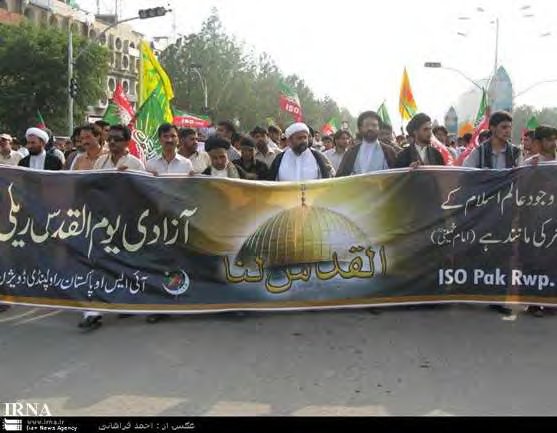

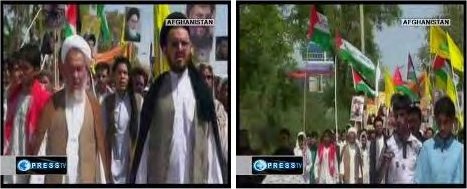



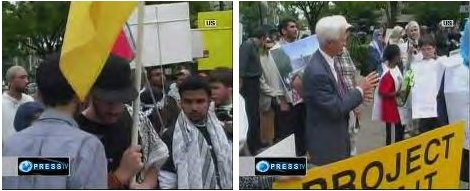

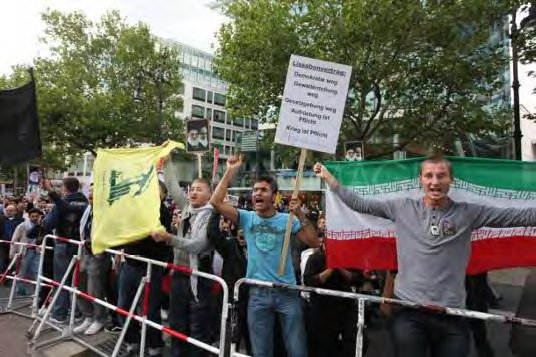

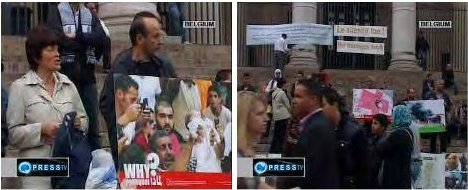
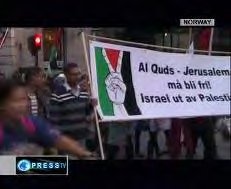
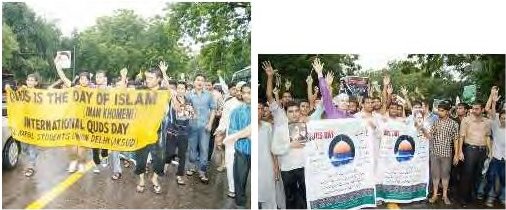

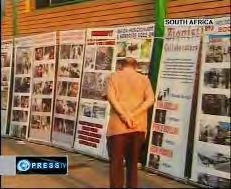

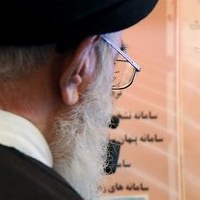
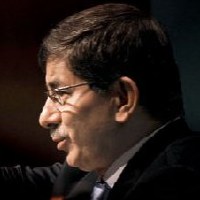
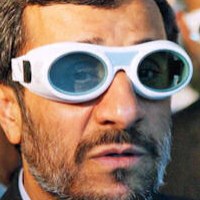
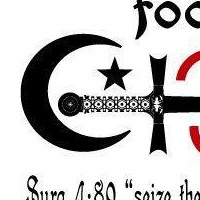
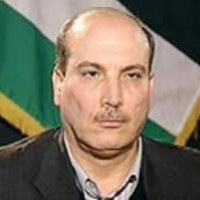




Quds Day Events Used to Support the Palestinian Cause and Hostility Towards Israel and the West | #iran #shia #jihad http://j.mp/acZURG
Quds Day Events Used to Support the Palestinian Cause and … http://bit.ly/bw8M37 #Lahore